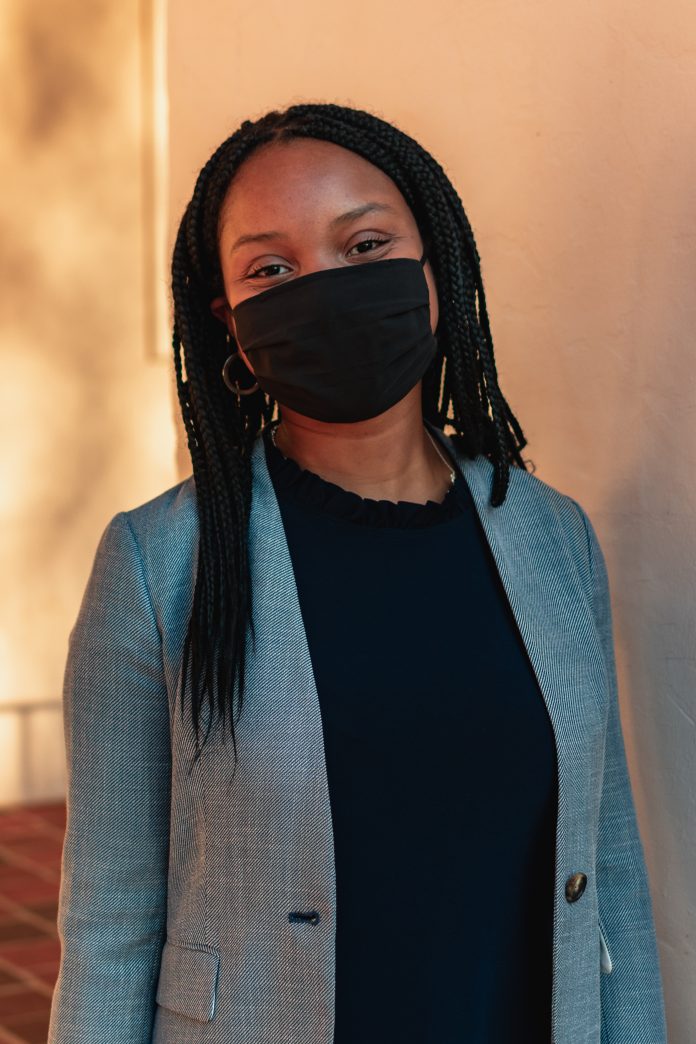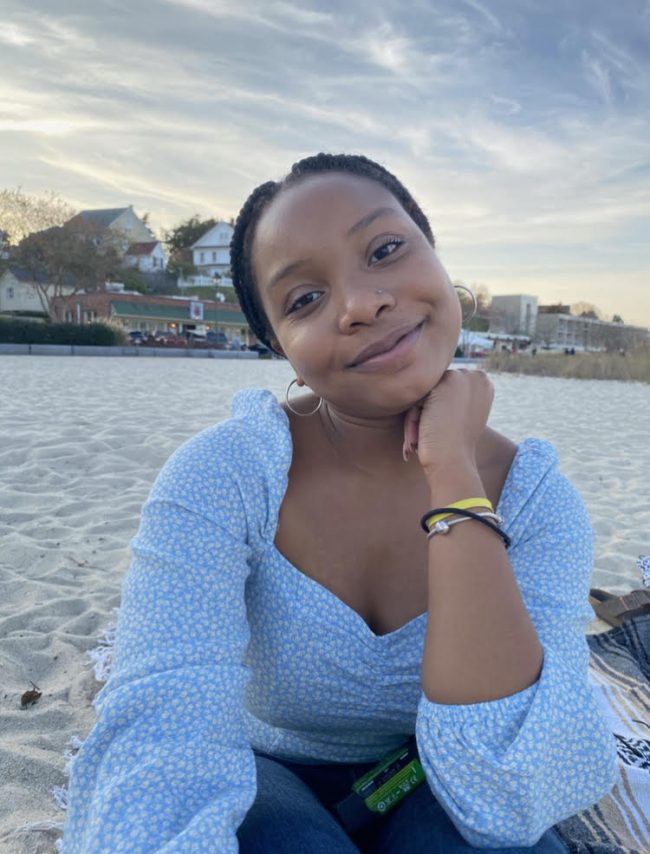
When she first came to the College of William and Mary, Zenobia Goodman ’22 never envisioned herself taking the helm of student government. Yet three years later, on Thursday, April 1, 2021, she was elected vice president of Student Assembly alongside former Senate Chair Meghana Boojala ’22.
Although Goodman and Boojala ran on an uncontested ticket, their victory still seemed inevitable given their extensive leadership roles on campus and enthusiasm for fostering a sense of community. Although many have noted Goodman’s status as an SA outsider, her ascension to the role is a testament to how much she’s grown during her time at the College.
When Boojala approached Goodman to discuss potentially running together, Goodman initially expressed skepticism but quickly realized it was an opportune time.

“Meghana reached out to me in January and was like, ‘oh, I’d love to meet’ … And it’s like, okay, I’ll entertain it,” Goodman said. “When I entered that meeting, I was like, ‘okay, this feels right.’ You know, it’s one of those things, I was like, ‘this feels like something that only I can do, something that could be impactful.’ So I think I was just like, ‘you know what, I’m gonna go for it.’”
Goodman is keenly aware that many students perceive SA as detached from their everyday lives. Now almost a month into her vice presidency, she is working to remedy this weakness by improving transparency and strengthening ties to students.
“I think at this point, with admin moving slowly and all that other stuff, students feel abandoned,” Goodman said. “And I think a lot of students don’t feel seen and heard, and I think that’s a problem. For Student Assembly, I think that our first priority is paying attention to those issues. I do think people feeling that Student Assembly is a safe space is more important than any bureaucracy will ever be to me, and I think that right now there is not a lot of trust there, with a lot of students and Student Assembly.”
While Goodman may not have formal SA experience, she has nonetheless built a repertoire of skills for collaborating with her colleagues and communicating with the College community.
“I think a lot of the leadership involvement I’ve had in my college career have involved a lot of listening,” she said. “I think they’ve involved a lot of like, sitting back and having to be introspective and figuring things out that way.”
“I think a lot of the leadership involvement I’ve had in my college career have involved a lot of listening,” she said. “I think they’ve involved a lot of like, sitting back and having to be introspective and figuring things out that way.”
For the past two years, Goodman has worked as a resident assistant, a decision that was inspired by her freshman year RA’s kindness.
The small but genuine moments Goodman shared with her freshman RA inspired the way she sees her residents now, as she cherishes the opportunity to witness them flourish and guide them along the way.
“Both years I’ve adored them,” Goodman said. “I genuinely have, it’s so sweet. I think my favorite part is watching them grow, like in that transition from fall semester to spring semester… And then the spring you just see this burst of independence for the most part. I’ll see them around campus with like, friends from outside of the hall and I just feel so proud.”
Goodman’s SA candidacy wasn’t the only news to make a splash on campus. In January, Goodman and eight members of the Omicron Beta Chapter of Chi Omega sorority published an open letter announcing their decision to leave. Simultaneously, they launched the Disaffiliate for Change account on Instagram, advocating for the College to abolish white Fraternity and Sorority Life.
“I think I dealt with a lot of guilt for a long time because of how I had felt very complacent,” Goodman said. “And I reflected a lot about, like, who in my life is complacent? How do I navigate those relationships? And I think this shift from complicity to advocacy, I think it felt like a very natural shift.”
Goodman was one of the first individuals to publish the details of her negative experiences with the racism and elitism embedded in Fraternity and Sorority Life. She described the moments leading it up to it as anxiety-ridden, but a wave of relief washed over her as the positive reactions rolled in.
“Obviously, everything in that letter, like, I completely stand by … but, you know, it’s the idea of having it outside in the universe makes it a little bit different,” Goodman said. “At first, like, it was scary, you know, coming from the community of white Greek life, it’s very easy to forget that that’s only 30% of the campus, roughly. And I think … a lot of people are very protective of their organizations and stuff like that. But I think after the letter came out, all of the support that we got, like, outside of white Greek life and the other 70% of the William and Mary campus meant the world, and I think just made the whole experience a lot better.”
While Disaffiliate for Change first drew widespread attention for posting testimonies, Goodman is determined to hone the account’s educational aim and preserve its influence on campus.
“The posts that get the most traction are, you know, a lot of the testimonies, but that’s okay, because I think that the resources are there, they’re out there,” she said. “And if people want to learn, they will. I think we’re in a pretty good spot right now. The biggest thing is making sure that there’s longevity, if that makes sense. I will always have love for the project, once I graduate, it might not be a primary focus for me anymore.”
“The posts that get the most traction are, you know, a lot of the testimonies, but that’s okay, because I think that the resources are there, they’re out there,” she said. “And if people want to learn, they will. I think we’re in a pretty good spot right now. The biggest thing is making sure that there’s longevity, if that makes sense. I will always have love for the project, once I graduate, it might not be a primary focus for me anymore.”
Goodman, an international relations major with a global studies minor, is no stranger to pedagogical pursuits. This summer, she will be teaching virtual classes for students in Bosnia through the William and Mary American Bosnian Collaboration.
“I think it’ll be good for me to learn how to navigate teaching completely virtually, like problem solving that way,” Goodman said. “And then I think it’s a good experience to have to just be able to, like, teach intercultural competence.”
In her free time, Goodman enjoys cross-stitching, watching “Grey’s Anatomy” and taking barre classes. She admitted that her self-care habits have been less than consistent, but it is a work in progress.
“This past semester, my self-care kind of fell off the wagon,” Goodman said. “I was just like, my biggest self-care thing was taking naps — which is its own form of self-care — but when that’s the only version of self-care, I had to kind of re-evaluate.”
Heading into her final year at the College, Goodman seems to have more responsibilities than ever on her plate. With SA reforms, research, volunteering and graduation around the corner, Goodman is living in the moment and appreciating her journey thus far.
When asked what she would tell her freshman self, Goodman said the following:
“Well, first of all, I’d tell her to chill out,” Goodman said. “It is somehow going to all work itself out and it’s going to be so much better than you would have ever expected. And you’re going to be fine. And stop doubting yourself. Don’t do that. You’re amazing. You’re actually incredible. In everything you’re doing, there is a purpose. You’re allowed to do things and just have fun. And you can just exist. There does not need to be a big grand reason behind everything.”



































